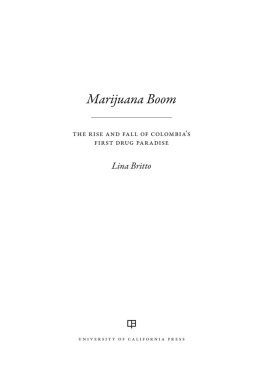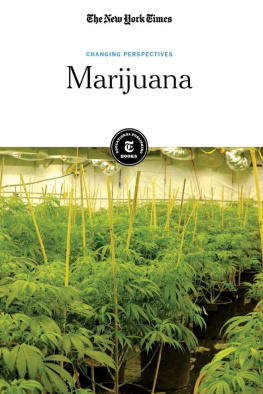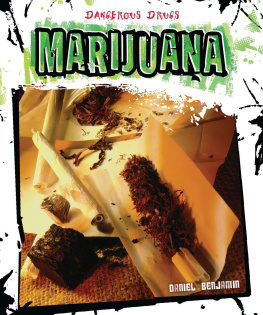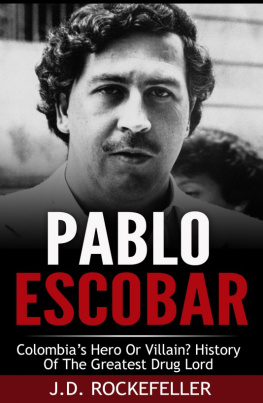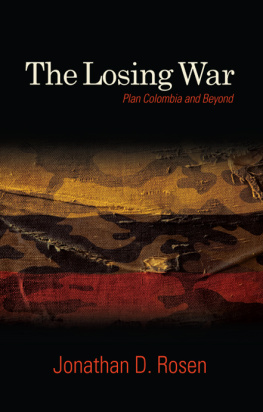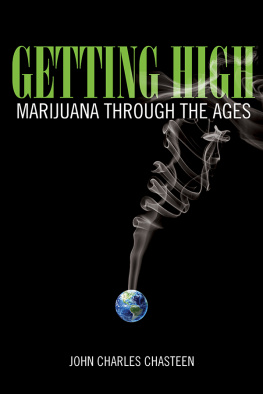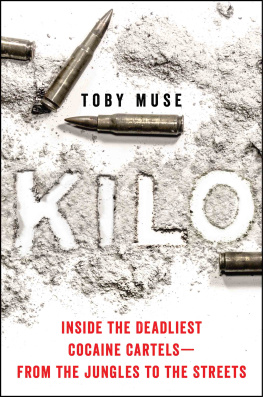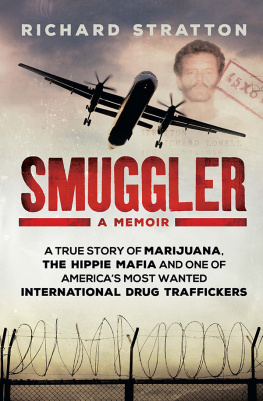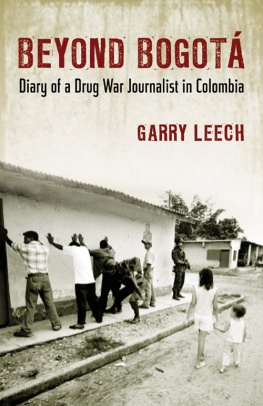University of California Press
Oakland, California
2020 by Lina Britto
Library of Congress Cataloging-in-Publication Data
Names: Britto, Lina, author.
Title: Marijuana boom : the rise and fall of Colombias first drug paradise / Lina Britto.
Description: Oakland, California : University of California Press, [2020] | Includes bibliographical references and index. Manufactured in the United States of America
Identifiers: LCCN 2019030166 (print) | LCCN 2019030167 (ebook) | ISBN 9780520325456 (cloth) | ISBN 9780520325470 (paperback) | ISBN 9780520974265 (ebook)
Subjects: LCSH : Drug trafficColombiaHistory. | Drug controlColombiaHistory.
Classification: LCC HV5840 . C7 B75 2020 (print) | LCC HV5840 . C7 (ebook) | DDC 364.1/336509861dc23
LC record available at https://lccn.loc.gov/2019030166
LC ebook record available at https://lccn.loc.gov/2019030167
27 26 25 24 23 22 21 20
10 9 8 7 6 5 4 3 2 1
Hurricane Winds: Vallenato Music and Marijuana Traffic in Colombias First Illegal Drugs Boom is abridged here from the original, published in Hispanic American Historical Review 95, no. 1 (2015): 71102. Copyright 2015, Duke University Press. All rights reserved. Republished by permission of the copyright holder, Duke University Press. www.dukeupress.edu.
ACKNOWLEDGMENTS
This book has been a labor of love about the region where I found my roots. I am grateful to all of my relatives and family friends who talked to me about the past and helped me to construct my own research landscape. I am especially in debt to my late grandmother Celinda Molina de Britto, known in town as Nina. Her love and intelligence were the forces that attracted me to the Guajira and sparked my curiosity about its history. Thanks to my aunts Marujita, Estela, and Juana Britto in San Juan del Cesar, and Elizabeth Machuca in Bogot, for their wisdom, care, and affection. Along with my father, my aunts and unclesRodrigo, Arique, Rubn, and Jaimetaught me how to approach regional culture with passion and respect. Special thanks to Rubn, who assisted me in Riohacha during the first stages of my research, and recently organized events in San Juan and Riohacha for me to share my work with general audiences; to Rafael Enrique, a renowned storyteller and civic leader better known as Arique, who shared his knowledge and memories and drove me around in his jalopy, introducing me to people who provided me with valuable information and insights; and to my father, Luis Carlos, simply Luchy, who passed along his love for reading and writing and gave me a lifelong class on vallenato musicmany times against my will. Forrest Hylton was my family during the years of research and dissertation writing and the person who prompted me to dare. Our love inspired me to undertake this project, and his generosity helped me to conduct preliminary research and sharpen the arguments of the PhD dissertation that serves as the foundation for this book. His son, Steele Miller, and mother, Peggy Celano, filled my days with joy. I cannot thank all of them enough for so many trips, laughs, and hugs.
At Universidad de la Cordillera, in La Paz, Bolivia, where I began this project as an MA thesis in anthropology, I am grateful to my classmates and professors, particularly Ramiro Molina Barrios, Rossana Barragn Romano, and Silvia Rivera Cusicanqui for introducing me to the depths of history. At New York University (NYU), where I became a historian, I am in debt to all my peers and mentors. Special recognition to Sinclair Thomson, my adviser during the first years in the program, and a generous friend and valuable interlocutor until today. I have benefited greatly from my adviser Barbara Weinstein, whose knowledge, enthusiasm, and optimism helped me navigate the rough waters of the profession; and from the marvelous Marilyn Young, giant historian and fairy godmother, who provided a model of how to be humane, brilliant, and fun. At Harvard University, where I began to transform the dissertation into this book, I received solid and steady support from Jorge Domnguez and the staff, mentors, and colleagues of the Harvard Academy for International and Area Studies. Thanks to all of them and especially to my dear friends Cristina Florea, Malgorzata Kurjanska, and Noora Lori, who along with Jen Fucelli helped sustain me through tectonic changes. At Northwestern University, where I became an educator, thanks to all my students for pushing me out of my comfort zone, especially to the graduate students who worked as TAs for some of the courses I taught while finishing the manuscript, Jayson Maurice Porter, Elsa de la Rosa, and Sarah-Louise Dawtry; and to the graduate students who took my seminar on modern Latin America during spring 2019 and whose brilliant discussions helped me rethink many of the central debates that I address in this book. My colleagues in the Department of History have taught me how to be a team player, while the staff have made possible every little (and big) thing. My greatest debts are to Helen Tilley and Mike Sherry, wise mentors and friends; Sarah Maza and Ed Muir, who read portions of this book and gave me relevant ideas for revision; Ken Alder and Laura Hein, lifesavers who provided me with unwavering support as chairs; the graduate students and faculty who attended the Chabraja Centers work-in-progress workshop in which I presented; and the staff and members of the Latin American and Caribbean Studies program, who bring the sunny disposition of the tropics to the Windy City.
The assistance of archivists and librarians was also indispensable. I thank the personnel of the Gilberto Alzate Avendao Library in Political History, the library of the Universidad Nacional, the Biblioteca Nacionals Hemeroteca, the Luis Angel Arango Library, and the Archivo General de la Nacin, all located in Bogot; the libraries of the Universidad del Magdalena and Fundacin ProSierra Nevada in Santa Marta; the Centro Cultural and Fondo Mixto para la Promocin de la Cultura y las Artes in Riohacha; and the Biblioteca Departamental del Cesar, Archivo Histrico del Cesar, and Fundacin de la Leyenda Vallenata in Valledupar. The help of Jhon Jairo Ortiz and Ofelia Muoz in the photographic archive of El Espectador in Bogot was essential. Special thanks to William Renn, Alvaro Mercado, and Antonio Navarro at the Universidad del Magdalena in Santa Marta; Roberto Villanueva at the Defensora del Pueblo in Maicao; Juan Carlos Gamboa at the Universidad Popular del Cesar; and Nelson Ramrez at the Biblioteca Departamental del Cesar in Valledupar. In the United States, I am grateful to the personnel at the National Archives in College Park, Maryland; the Fales Library and Tamiment Library at the Elmer Holmes Bobst Library at NYU; the Widener Library, Houghton Library, and Law School Library at Harvard University; Albert Nason and his team at the Jimmy Carter Presidential Library in Atlanta; Michael Evans and his collaborators at the National Security Archive in Washington, D.C.; Leigh Grissom and assistant registrars at the Center for Creative Photography at the University of Arizona in Tucson; and to Paula Covington and the staff of the Special Collection of Vanderbilt Universitys library in Nashville.
The financial support of the institutions that granted me fellowships for travel, research, publication, and living expenses was crucial. These include the Tinker Foundation; the Center for Latin American and Caribbean Studies and the Graduate School of Arts and Science at NYU; the Social Science Research Council, the Universidad de los Andes, the Open Society Foundation, and the International Development Research CenterCanada; the Woodrow Wilson National Fellowship Foundation and the Charlotte Newcombe Foundation; and the Alice Kaplan Institute for the Humanities and the Department of History at Northwestern University.

